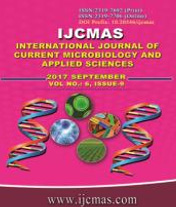


 National Academy of Agricultural Sciences (NAAS)
National Academy of Agricultural Sciences (NAAS)

|
PRINT ISSN : 2319-7692
Online ISSN : 2319-7706 Issues : 12 per year Publisher : Excellent Publishers Email : editorijcmas@gmail.com / submit@ijcmas.com Editor-in-chief: Dr.M.Prakash Index Copernicus ICV 2018: 95.39 NAAS RATING 2020: 5.38 |
A survey was conducted in Kodaikanal hills of Tamil Nadu, India to know the association of root-knot nemtode, Meloidogyne hapla in carrot (Daucus carota subsp. sativus). The nematode was found in eight carrot growing villages surveyed at Kodaikanal. Infestation was high (150-300 nematodes/200 cm3 soil) at Poomparai followed by moderate (50-150 nematodes/200 cm3 soil) at Poondi, Kookal, Mannavanur and Shenbananur villages. Low density (0-30 cysts/200 cm3 soil) was observed at Kookal, Shenbananur, Poondi, Gundupatti and Pallangi villages. The population density was low (0-50 nematodes/200 cm3 soil) at Kodaikanal and Mannavanur villages. A field study was conducted to estimate the avoidable yield loss due to natural populations of M. hapla on carrot. The 19.1% % root tuber yield loss was observed due to natural populations of M. hapla. It was also estimated that M. hapla infestation leads to 59.3 % market loss due to root tuber malformation. Pot experiment was alos conducted to confirm the yield loss estimation using challenge inoculated populations of M. hapla. Results revealed that inoculum level of 10,000 juveniles/pot could cause tuber yield loss of 55.1%. It is concluded that efforts are needed to reduce the M. hapla infestation and to check further spread in carrot fields at Kodaikanal hills.
 |
 |
 |
 |
 |